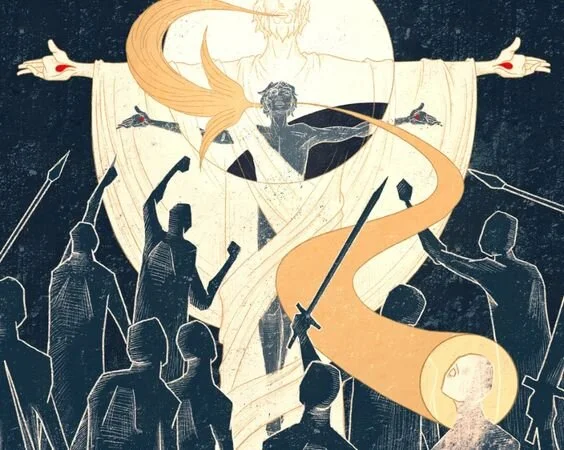Unbinding the Tongue of the Cynic
“The Lord God has given me the tongue of those who are taught, that I may know how to sustain with a word him who is weary.”
The prolific exegetical artist Chris Powers of Full of Eyes interprets Isaiah 50:4-6, a portion of our reading from the Prophets for this week. In the place of God is the figure of Christ crucified, whose word and spirit goes forth to and through the figure of the Suffering Servant, and in turn, to the be a “sustaining word” to the one figure in the restless crowd, “weary” of their rabble.
“I believe; help my unbelief!”
— Prayer of a Desperate Father (Mark 9:24)
Sixteenth Sunday after Pentecost
Texts for This Week
Prayer
O God, because without you we are not able to please you, mercifully grant that your Holy Spirit may in all things direct and rule our hearts; through Jesus Christ our Lord, who lives and reigns with you and the Holy Spirit, one God, now and for ever.
All who Love and Serve your City
The Harvard University Choir performs a notable composition of the Congregationalist pastor and eminent hymnographer Erik Routley. Routley wrote this hymn in 1966, reflecting on the unrest and division precipitated by the Watts riot in LA. Admirably humble in tone, the hymn summons us, on the one hand, to consider our work in light of Jesus’s summons to work while it is day; but on the other, gestures to his offer of peace from the hill of Calvary, and cries out for the Lord, our judge and glory, to come, and save us from languishing as the “city of despair.”
The hymn tune, CHARLESTOWN, is an old Sacred Harp melody. For a sing along version, the Young Trio has a nice performance of the hymn as printed in the Episcopal Hymnal 1982. Following the death of George Floyd and subsequent protests, St. Alphonsus Catholic Church in a suburb outside of Minneapolis produced a version of the hymn for quiet contemplation as a “song of discomfort,” set to Peter Cutts melancholic modern melody, BIRABUS.




